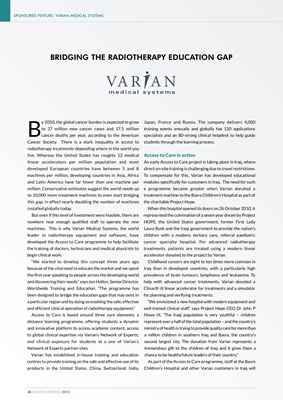
SPONSORED FEATURE: VARIAN MEDICAL SYSTEMS
48 CANCER CONTROL 2015
B
y 2050, the global cancer burden is expected to grow
to 27 million new cancer cases and 17.5 million
cancer deaths per year, according to the American
Cancer Society. There is a stark inequality in access to
radiotherapy treatments depending where in the world you
live. Whereas the United States has roughly 12 medical
linear accelerators per million population and most
developed European countries have between 5 and 8
machines per million, developing countries in Asia, Africa
and Latin America have far fewer than one machine per
million. Conservative estimates suggest the world needs up
to 10,000 more treatment machines to even start bridging
this gap, in effect nearly doubling the number of machines
installed globally today.
But even if this level of investment were feasible, there are
nowhere near enough qualified staff to operate the new
machines. This is why Varian Medical Systems, the world
leader in radiotherapy equipment and software, have
developed the Access to Care programme to help facilitate
the training of doctors, technicians and medical physicists to
begin clinical work.
"We started to develop this concept three years ago
because of the vital need to educate the market and we spent
the first year speaking to people across the developing world
and discovering their needs," says Jon Hollon, Senior Director,
Worldwide Training and Education. "The programme has
been designed to bridge the education gaps that may exist in
a particular region and by doing so enabling the safe, effective
and efficient clinical operation of radiotherapy equipment."
Access to Care is based around three core elements: a
distance learning programme, offering students a dynamic
and innovative platform to access academic content; access
to global clinical expertise via Varian's Network of Experts;
and clinical exposure for students at a one of Varian's
Network of Experts partner sites.
Varian has established in-house training and education
centres to provide training on the safe and effective use of its
products in the United States, China, Switzerland, India,
Japan, France and Russia. The company delivers 4,000
training events annually and globally has 120 applications
specialists and an 80-strong clinical helpdesk to help guide
students through the learning process.
Access to Care in action
An early Access to Care project is taking place in Iraq, where
direct on-site training is challenging due to travel restrictions.
To compensate for this, Varian has developed educational
modules specifically for customers in Iraq. The need for such
a programme became greater when Varian donated a
treatment machine to the Basra Children's Hospital as part of
the charitable Project Hope.
When this hospital opened its doors on 26 October 2010, it
represented the culmination of a seven year dream by Project
HOPE, the United States government, former First Lady
Laura Bush and the Iraqi government to provide the nation's
children with a modern, tertiary care, referral paediatric
cancer specialty hospital. For advanced radiotherapy
treatments, patients are treated using a modern linear
accelerator donated to the project by Varian.
Childhood cancers are eight to ten times more common in
Iraq than in developed countries, with a particularly high
prevalence of brain tumours, lymphoma and leukaemia. To
help with advanced cancer treatments, Varian donated a
Clinac® iX linear accelerator for treatments and a simulator
for planning and verifying treatments.
"We envisioned a new hospital with modern equipment and
well-trained clinical staff," says Project Hope CEO Dr John P
Howe III. "The Iraqi population is very youthful - children
represent over a half of the total population - and the country's
ministry of health is trying to provide quality care for more than
a million children in southern Iraq and Basra, the country's
second largest city. The donation from Varian represents a
tremendous gift to the children of Iraq and it gives them a
chance to be healthy future leaders of their country."
As part of the Access to Care programme, staff at the Basra
Children's Hospital and other Varian customers in Iraq will
BRIDGING THE RADIOTHERAPY EDUCATION GAP